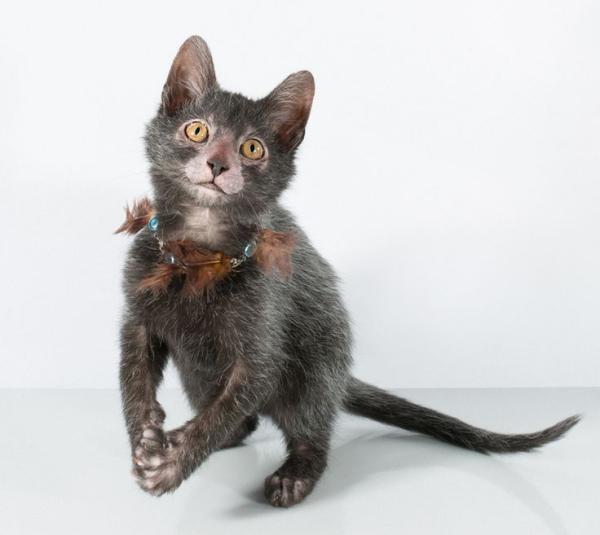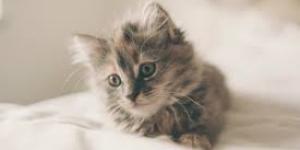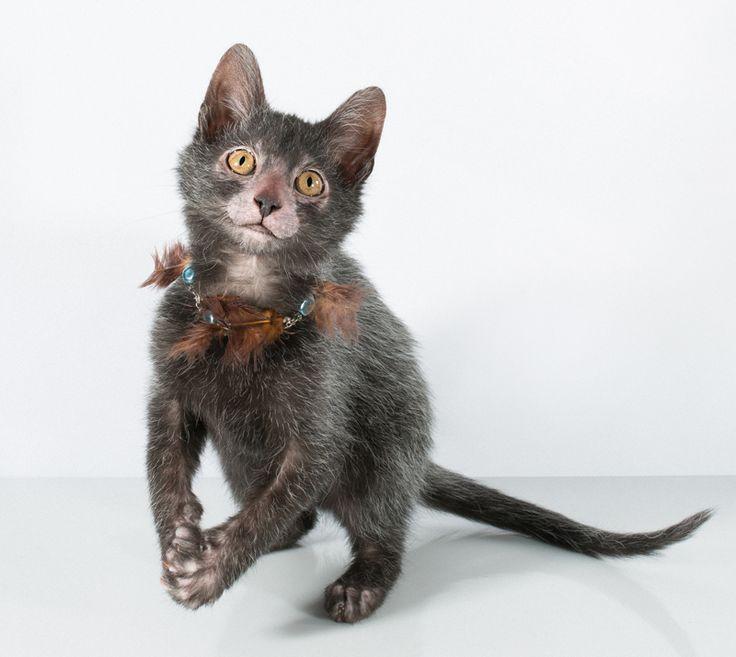Lykoi (Werewolf cat)

If you have heard of or seen a lykoi cat, you were probably taken aback. This breed never leaves anyone indifferent. They are one of the newest breeds of domesticated felines. In fact, they are still in the process of being fully admitted as a breed because they are only a few specimens worldwide. This feline is gaining popularity quickly, especially in the US. They emerged in the Southern states Virginia and Tenessee, where they are best known at the moment.
Continue reading this AnimalWised breed file to discover everything you need to know about the lykoi or werewolf cat, a truly incredible breed.
- America
- United States
- 7-11
- 11-13
- 13-17
- 17-22
- 22-30
- 8-10
- 10-15
- 15-18
- 18-20
Origin of the Lykoi cat
The lykoi cat began to appear in 2010, in two unrelated cases - one born in Virginia and the other in Tennessee. Thus, the origin of this feline race is the United States of America. The appearance of this breed was due to a natural mutation of the domestic shorthair. Although over the last 20 years kittens have appeared with some different traits, they have not been so distinct from other breeds.
The mother was a common black cat, but all the kittens were born with strange fur with some hairless parts. Therefore, it was believed that they could be related to sphynx cats. Veterinary and genetic studies were carried out at US universities because the owners were concerned the kittens may have some health problems. But, it was ruled out that these physical traits were due to illness and the relationship with the sphynx was also denied. Thus, they have no genetic relation with hairless cats or other similar breeds like the Devon rex.
Their interesting appearance also gave them an interesting name; the word "Lykoi" means "wolf" in Greek. Although they are not related to wolves anywhere, their fur and their eyes remind us of these animals.
At the moment, there are only a few dozen lykoi cats around the world . To establish a consolidated breed, breeders are assisted by the University of Tennessee to prevent the onset of diseases and genetic problems.
Physical characteristics of the Lykoi
Physically, as you can see in the images of the lykoi cat that you will find at the end of this file, they have a stylized body, a very peculiar coat and yellow eyes that give their wolfish appearance
They are domestic cats of average size, since they weigh between 3.5 and 7 kg, and the males are larger than the females. The shape of the head is a bit triangular, their eyes are large and yellow (and intensifies when they grow), and their nose is always black.
The coat is short and of the color roan. That is to say, their base color is black or gray and they have white hairs and tufts, giving them a mixed and disordered coat appearance. In addition, the hair type is soft even if it has a hard or rough appearance.
A curious fact is that when they are born they have very little or no hair on their snout, the outline of their eyes, belly, ears and sometimes also on the legs. The most common thing is that as they grow, so does their coat and finishes covering all these parts, although it can be lighter in some. With this said, there are some adult specimens with no hair around these areas.
Temperament
Although their appearance may seem somewhat fierce, the wolf cat has the normal character of any other domestic cat. Therefore, people who have already lived with some of them, describe them as very affectionate, sweet, friendly, playful, cheerful, very intelligent, somewhat mischievous and quite active. In addition, they have a hunter instinct and are somewhat distrustful of those they do not know yet, although they take little time to approach and become friendly quickly. In fact, a lot of people have compared them with dogs in terms of their character.
These felines have been accustomed since childhood to live with people and fellow pets, because there are so few of them.
Caring for a Lykoi cat
The care of their coat requires basic brushing, since being short-haired will only need two brushes weekly and daily during the molting season. As cats clean themselves, in principle, it is not necessary to bathe them and avoid damaging the natural protective layer of their skin. It is only advisable to clean them when they become very dirty and, in that case, it is advisable to use dry shampoos or cloths or wipes. If we use a shampoo to wash them, it must be specially catered for cats and never for humans or other animals.
As far as the feeding of this breed, it must be of high quality. Otherwise, we will begin to see health problems if they lack necessary nutrients. It is important that we adjust their diet to their age, physical activity and health. In addition to commercial feed, you can also give them some healthy homemade food every day, something they will love.
Also, as with any other domestic cat, we have to note that their ears, eyes, claws and mouth must remain clean and undamaged. We may have to wipe their eyes, teeth, and ears sometimes and also trim their claws, especially if any break.
Health
At the moment, it is believed that their life expectancy is like that of a common cat. That is why it is estimated that they can reach 20 years of life. Of course, this is all just taken from their short existence thus far.
So far no specific diseases or conditions of this breed have been detected and no specific health problem has been found, but their health has been shown to be excellent. Thus, the problems they may have are those that affect any other domestic cat, that is, they may suffer from some of the most common diseases in cats.
Thus, in order to prevent any disease or condition, it is vital that the vaccination schedule for cats be followed and also that external and internal deworming be performed, whether the animal spends all the time at home or frequently goes outside. Finally, to take good care of their health, we advise you to take them to the veterinarian every 6 or 12 months. Thus, making sure everything is going well.
Lykoi (Werewolf cat) photos











 best cat on earth amazing breed, lots of character! this article is so good and accurate. thank you so much, this helped me so much. thanks :)
best cat on earth amazing breed, lots of character! this article is so good and accurate. thank you so much, this helped me so much. thanks :)




